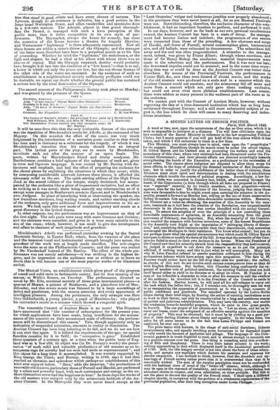The venerable Concert of Ancient Music is no morel The
Directors have announced that "the number of subscriptions for the present year, for which applications have been made, being insufficient for the mainte- nance of the concerts on their accustomed scale of efficiency, the perform- ances ,will be discontinued this season." This, though apparently only an indication of suspended animation, amounts in reality to dissolution. The Ancient Concert has been long tottering to its fall, and we do not see how it can ever rise again. It is behind the requirements of the age; no special function remains for it to fulfil; its occupation is gone." Established three carters of a century ago, at a time when the public taste of Eng- land Was at a low ebb, its object was (in Dr. Barney's words) the preser- vation "of such solid and valuable productions of old masters as an in- temperate rage for novelty had too soon laid aside as superannuated "- and this object for a long time it accomplished. It was warmly supported by King George the Third; and Burney, writing in 1789, says it had then reached an elevation and splendour which perhaps no establishment of this kind ever enjoyed before. "Here," adds the historian " the productions of venerable old masters, particulary those of Purcell and Handel, are performed by a select and powerful band, with such correctness and energy as the au- thors themselves never had the happiness to hear." In those days the works of the old masters were enjoyed only by the aristocratic habitues of the An- cient -Concerts In the Metropolis they were never beard except at the
"Lent Oratorios," vulgar and indecorous jumbles now properly abandoned in the provinces they were never heard at all, for as yet Musical Festivals were not. Notwithstanding, therefore, the exclusive character of this esta- blishment, it had an important function to perform, and performed it welL In our days, however, and as far back as our own personal recollections extend, the Ancient Concert has been in a state of decay. Its manage- ment had become listless and indolent; the programmes of one season were concocted from those of the preceding. A few choruses and songs of Handel, still fewer of Purcell, several commonplace glees, harmonized airs, and old ballads, were reiterated to tiresomeness. The subscribers fell away and the end was often prognosticated. A stimulus to the manage- ment, indeed, was given by Prince Albert; through whose exertions, and those of Sir Henry Bishop the conductor, material improvements were made in the selections and the performances. But it was now too late; the downward impulse could not be arrested; and in the mean time every- thing that was or could be done at the Ancient Concert was better done elsewhere. By means of the Provincial: Festivals, the performances in Exeter Hall, &c., new ideas were formed of choral music, and the works of the old masters were produced on a scale and in a manner which the Ancient Concert could not emulate; and the aristocracy fell off more and more from a concert which not only gave them nothing exclusive, but could not even rival more plebeian establishments. Last season, there were seldom as many persons in the audience part of the room as in the orchestra.
We cannot part with the Concert of Ancient Mush), however without regretting the fate of a time-honoured institution which has so long been celebrated throughout Europe; and a still more substantial subject of re- gret is, the loss which its close will cause to many deserving and indus- trious musicians.


























 Previous page
Previous page